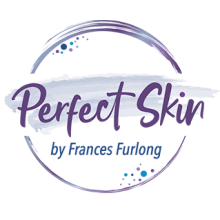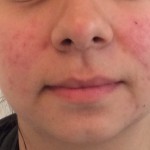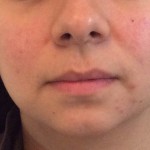Rosacea is an inflammatory skin disorder, often referred to as ‘the curse of the celts’ as it predominantly effects Celtic skin types. It generally effects the cheek area chin and nose . It is a multifactorial condition that is greatly influenced by sebum in the skin, hormonal fluctuations, genetics and lifestyle.
Rosacea causes a range of symptoms, although not everyone will experience them all.
Most people with rosacea have periods when their symptoms are particularly troublesome, followed by periods when their symptoms are less so.
The main symptoms of rosacea include:
-flushing
-persistent facial redness
-visible blood vessels
-papulex and pustules
-thickened skin
Other symptoms associated with rosacea include:
-sensitive skin – burning, itching, stinging and pain
dry, rough skin
-raised red patches (plaques) on your skin
-facial swelling (lymphoedema)
Permanent damage to the face (scarring) almost never occurs in rosacea, so it can be managed and repaired with specialist help.
Factors for rosacea triggers are sun exposure, hot humid weather, emotional stress, wind, heavy exercise, alcohol, hot baths, cold weather, spicy foods, certain skin care products that contribute to excessive oil. As you can see extremes of anything can effect the person. It is not realistic to expect avoidance of some or all of these activities so it is crucial when I am assessing patients that I personalise a treatment plan for them in terms of in clinic treatments, home care maintenance and extra support and guidance especially when going on holidays .
The diagnosis for those suffering with this painful and embarrassing issue is that it is a disease of the sebaceous glands, patients often have a trigger in the early thirties due to a surge in subum production and growth in the sebaceous glands.
Typically, sebaceous glands produce excessive amounts of very destructive oil and an altered chemical composition can tat leads to inflamed sore skin, pustules, bulbous areas such as rhinophyma ( ballooning of the nose) inflammation in the cutaneous tissue due to a surplus of oil weakens the skin barrier function.
It is essential that proper creams are given speciafically to help mange the condition, I particularly get good results for my clients with obaji rozatrol for daily use, it helps to relieve the visible symptoms and it normalises skin by reducing excess oil, which ultimately leads to inflammation, in extreme conditions I will prescribe topical creams. It is very important to advise clients to protect there skin daily with a good spf protector.as it is widely documented that the premier trigger of rosacea in 81% of patients , however 88% of rosacea suffered when applying sunscreen daily report a decrease in flare ups.
Sadly for rosacea suffered this is a chronic life long disorder that requires management, support and empathy


